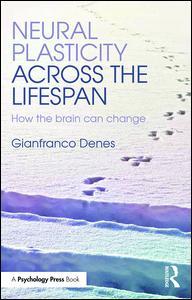Description
Neural Plasticity Across the Lifespan
How the brain can change
Author: Denes Gianfranco
Language: English
Subject for Neural Plasticity Across the Lifespan:
Keywords
Neuroscience; Cognitive Development; Brain structure; Rehabilitation; Lifespan Development; Neural Plasticity; Cross-modal Plasticity; Long Term Potentiation; Transcranial Direct Current Stimulation; Left Hemisphere; CI; MD; ASD Subject; Nib Technique; SSDs; Spinal Cord; Nib; Semantic Dementia; Primary Progressive Aphasia; rTMS Application; Hippocampal Grey Matter Volume; Late Stage Recovery; Auditory Cortex; Cortical Excitability; Secondary Motor Areas; Braille Reading; Repetitive Transcranial Magnetic Stimulation; Inter-individual Differences; Functional Plasticity; Anterior Insular Cortex
Publication date: 11-2015
· 13.8x21.6 cm · Paperback
Publication date: 12-2015
· 13.8x21.6 cm · Hardback
Description
/li>Contents
/li>Readership
/li>Biography
/li>
Neural Plasticity Across the Lifespan reviews the recent scientific developments which are transforming our understanding of the human brain. For many years it was thought that modifications to the structural and functional organization of the brain were limited to a short early period of life, "the critical period", and, in adults, to the memory system. Recent research suggests that on the contrary we should see the human brain as a flexible structure, which adapts and modifies in response to learning, sensory experience, age and disease.
The book provides an integrated overview of contemporary research on neural plasticity - the process by which the brain can change in structure and function to cope with new experiences and react to the effects of acquired damage or sensory deprivation. It reviews data on plasticity in the developing brain, looking at both typical and atypical development, alongside clinical and observational research on the adult population. It covers a number of key topics, including:
- different forms of neural plasticity
- factors affecting neural plasticity (ageing and gender),
- neural plasticity in language acquisition, memory and bodily self-consciousness
- mechanisms of repair ? plasticity following sensory deprivation and acquired brain damage.
This is an accessible overview of an emerging field of research which has fundamental implications for how we perceive our potential to change throughout our lives. It will be essential reading for all students of cognitive development, cognitive neuroscience and lifespan development.
Preface Section 1: Introducing Plasticity 1. Plasticity: A Tentative Definition2. Neural Plasticity: General Principles Section 2: The Role of Specific Factors on Neural Plasticity 3. The Impact of Demographic Factors in Shaping Neural Plasticity Section 3: Specific Skills 4 Language and Neural Plasticity 5. Memory Skills and Brain Plasticity 6. The Self and its Brain Selected 4: The Mechanisms of Repair 7. Sensory Deprivation and Neural Plasticity 8. Plasticity and Recovery of Brain Damage
Gianfranco Denes is a Neurologist. He has been Director of the Neurological Unit at City Hospital, Venice, Italy, and taught Neuropsychology and Neurolinguistics at the Universities of Padova and Venice. His research field spanned many aspects of Cinical Neuropsychology, from language disorders (aphasia) to impairments of memory and spatial knowledge following acquired brain lesions.




